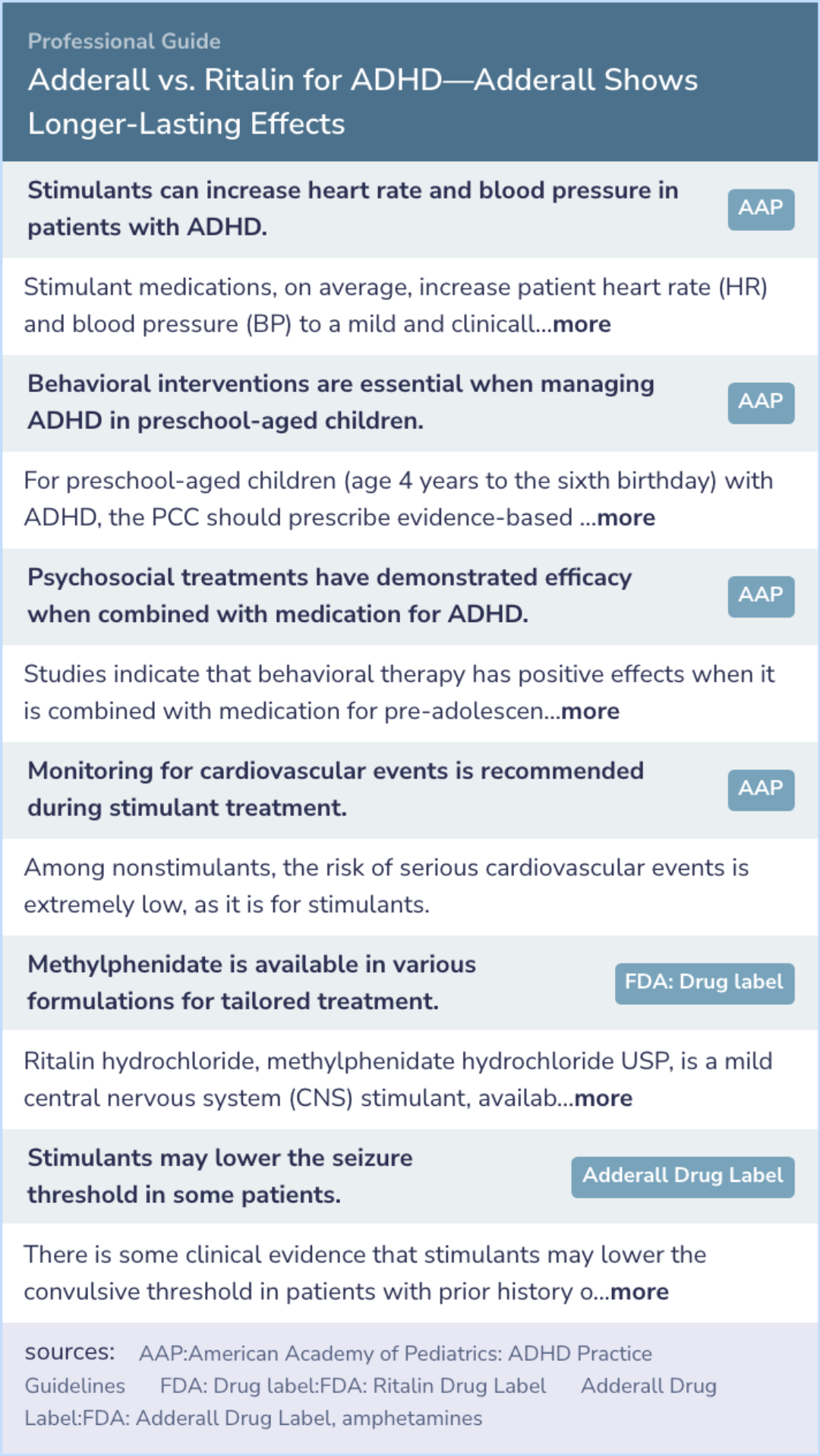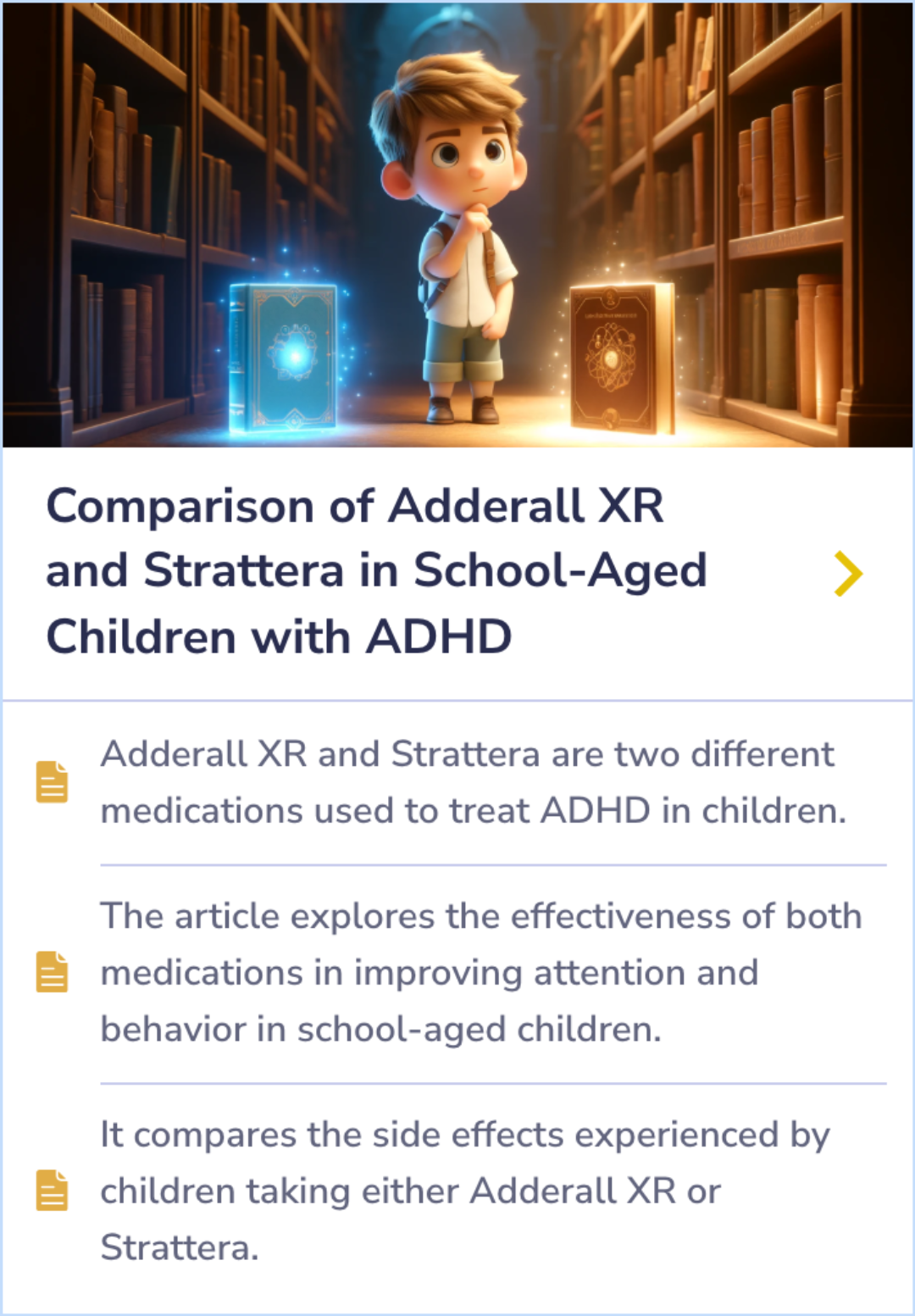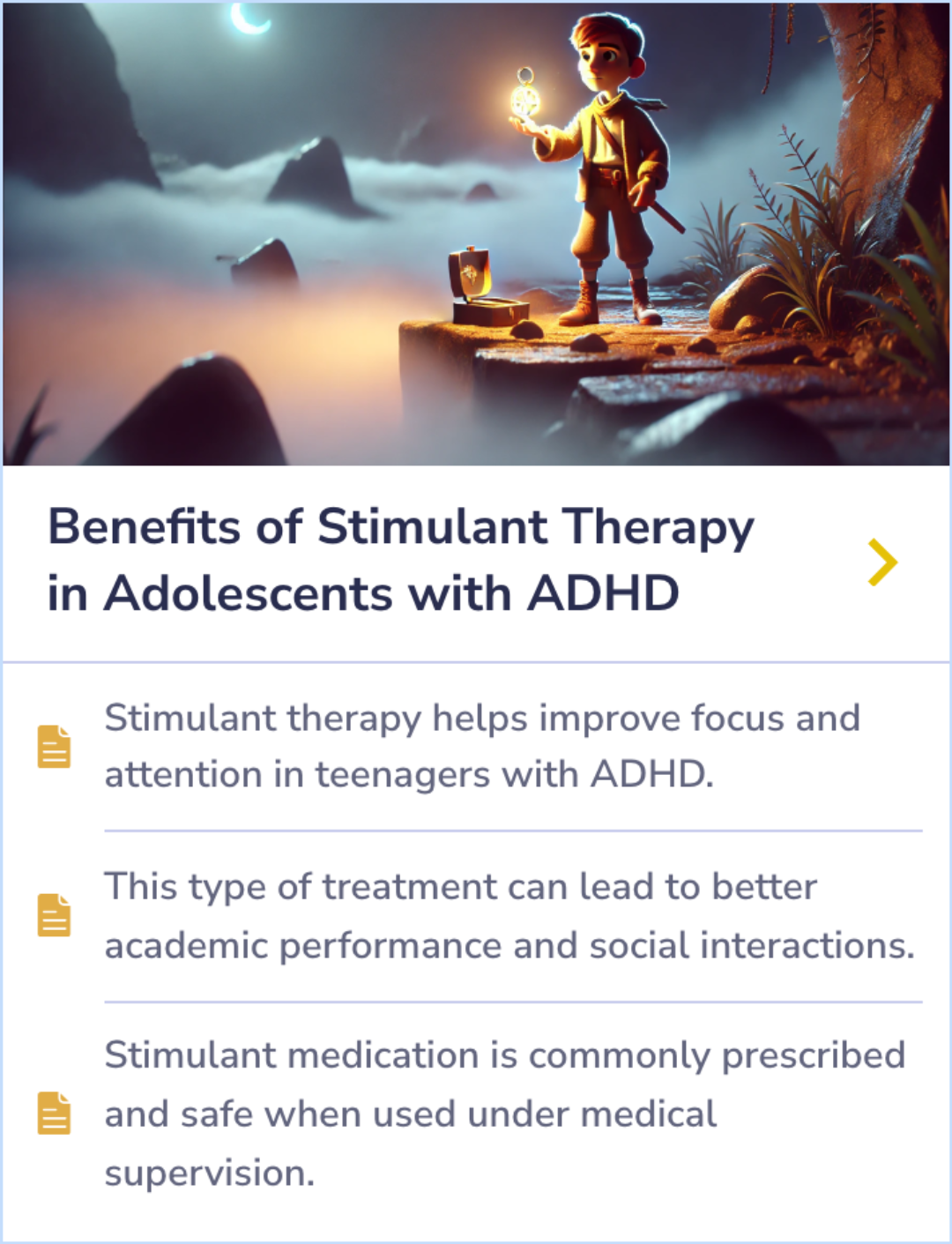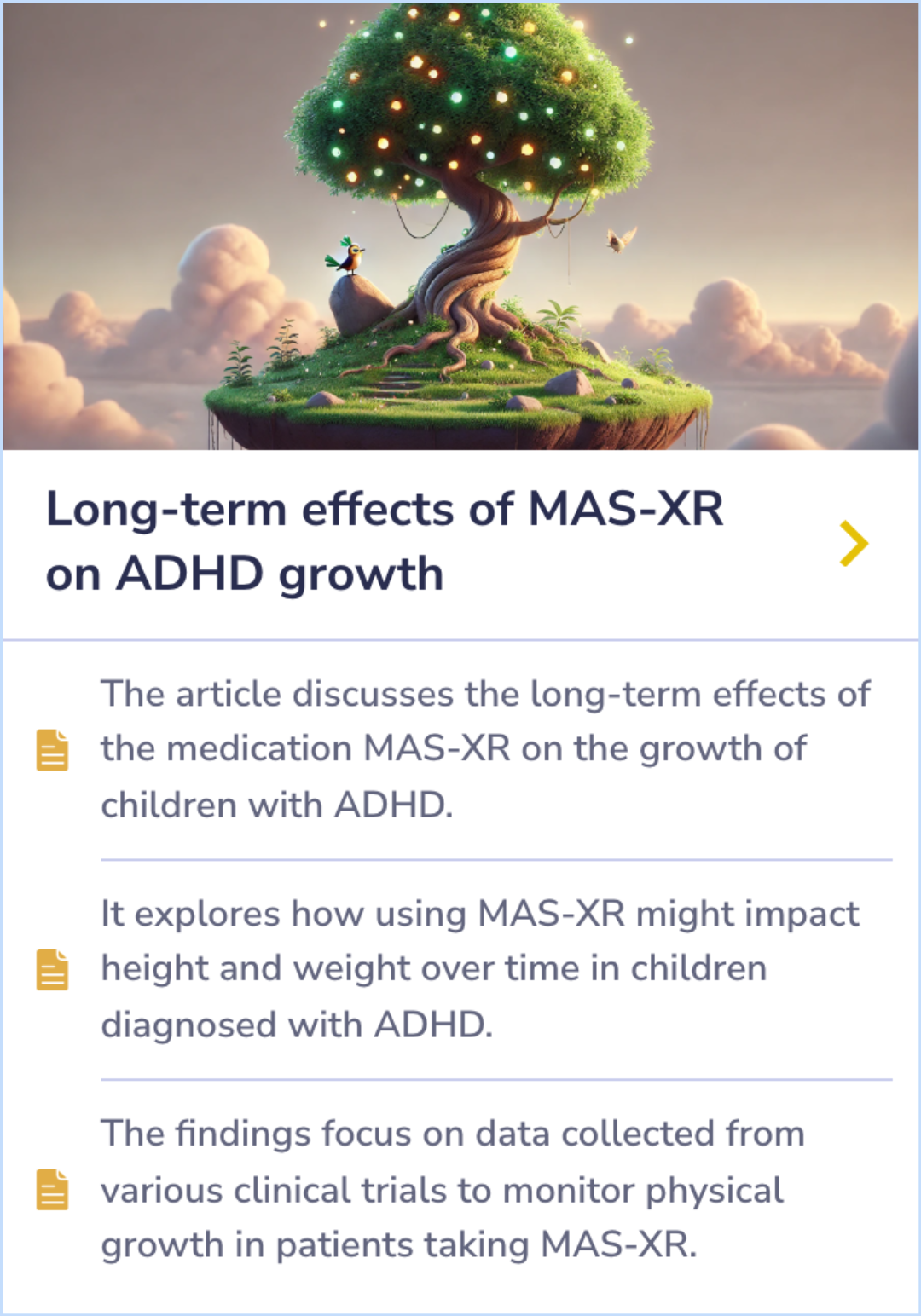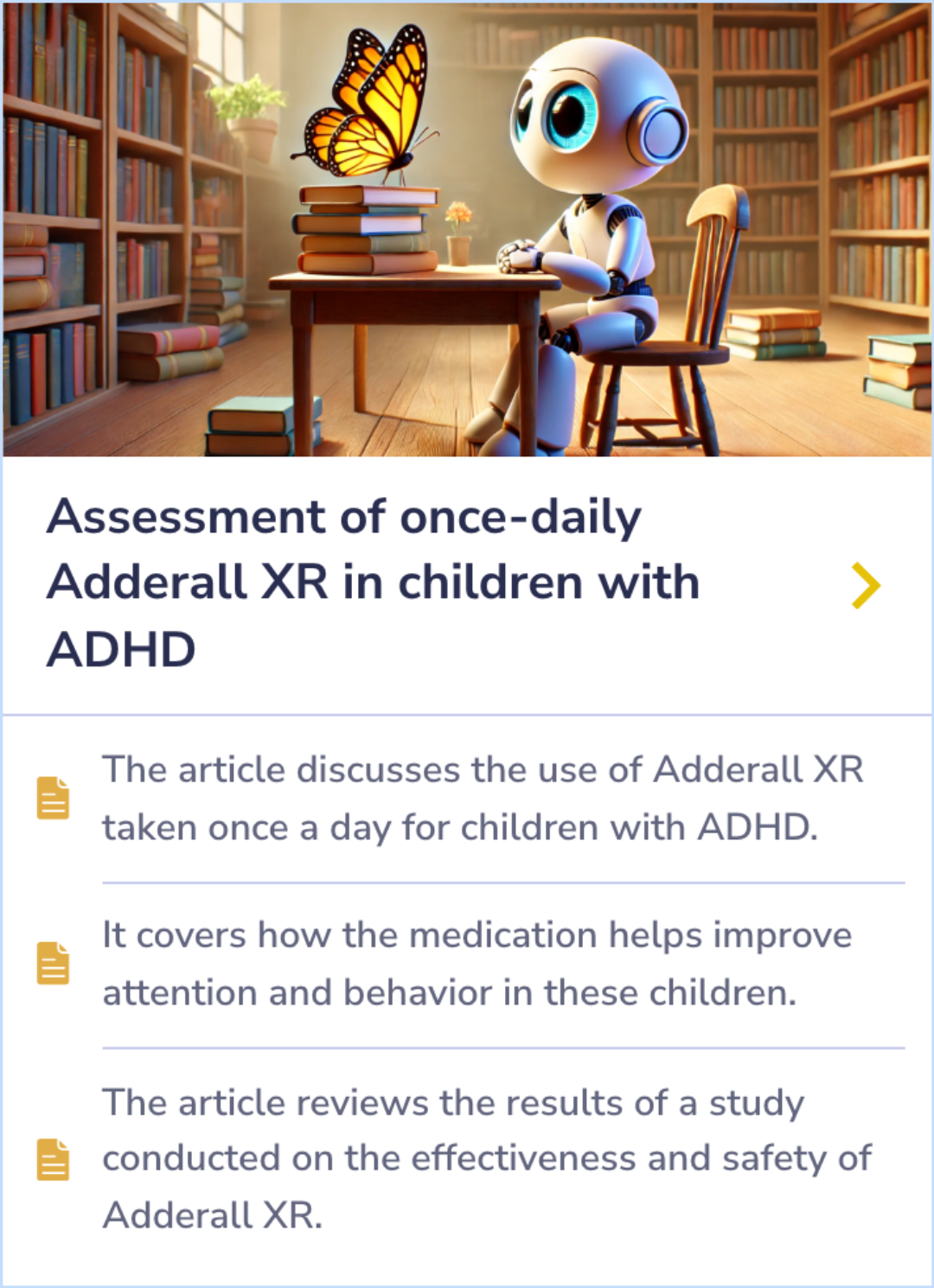Adderall Study Database
Visual Abstract
A comparison of ritalin and adderall: efficacy and time-course in children with attention-deficit/hyperactivity disorder
Comparison of Ritalin and Adderall in ADHD treatment
October 18, 2024
author
Pelham WE, Aronoff HR, Midlam JK, Shapiro CJ, Gnagy EM, Chronis AM, Onyango AN, Forehand G, Nguyen A, Waxmonsky J
journal
Pediatrics
Date Published
1999 Apr
Why link to a visual abstract?
What is a visual abstract?
Original
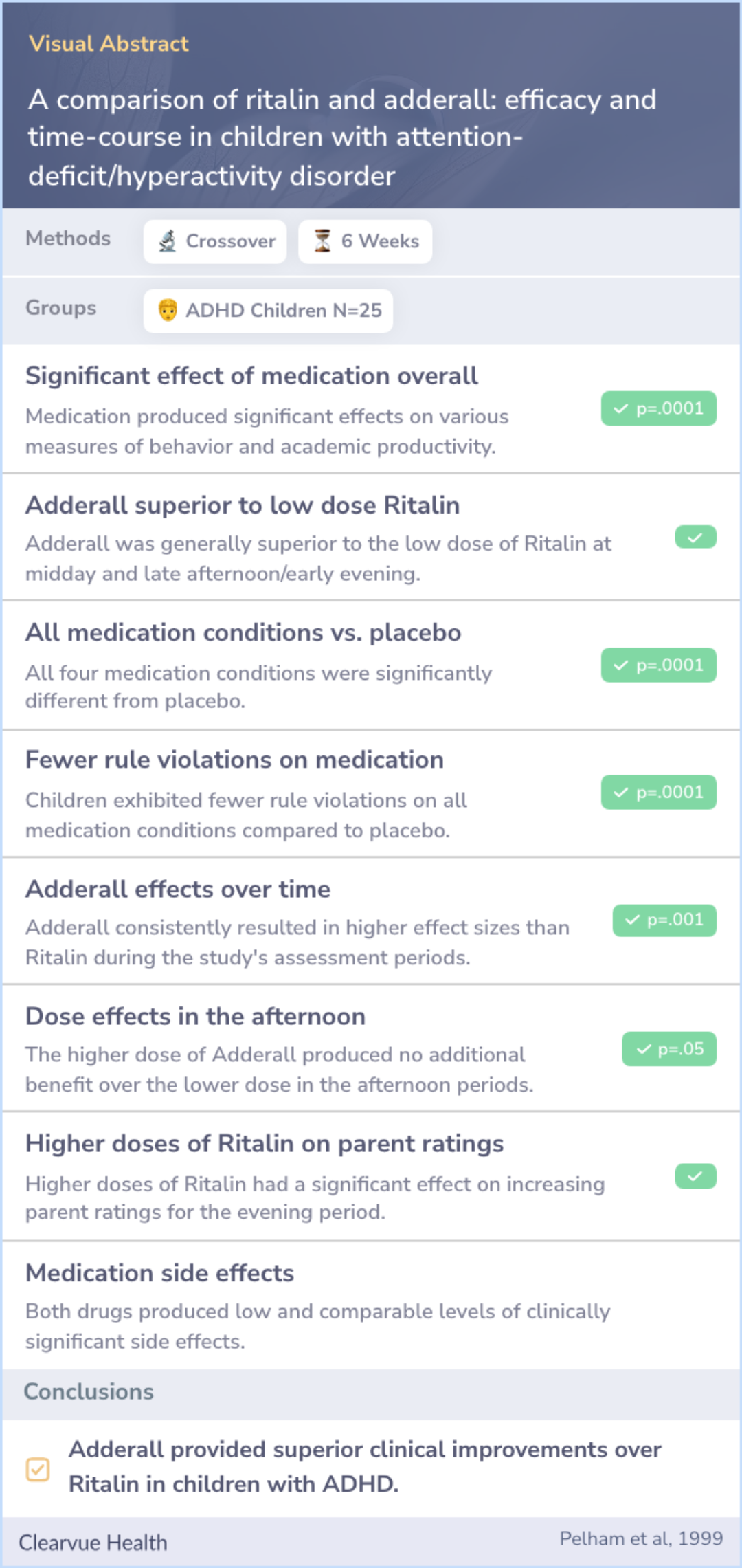
Study Summary
🔬
What They Studied
The study aimed to compare the efficacy and time-course of Adderall and Ritalin in treating ADHD in children.
💡
What They Found
Adderall demonstrated superior efficacy over Ritalin, particularly as Ritalin's effects diminished, although both improved behavior and academic performance significantly.
📚
What This Means
These findings suggest that Adderall may provide longer-lasting effects than Ritalin, consistent with its known longer half-life, and aligns with current understanding of its effectiveness in ADHD treatment.
Study Summary
Study Overview
Adderall is an effective treatment for ADHD, similar to Ritalin, improving children's behavior and academic performance. Both medications produced significant improvements in social behavior during group activities. The effects of Adderall last throughout the day, particularly benefiting children when Ritalin's effects may fade. Research indicates that the typical doses of Adderall and Ritalin produce minimal side effects. Adderall has been shown to effectively support children's daily functioning in school, aligning with historical efficacy data. This approval reflects its potential for better management of ADHD symptoms in various settings.
Children with ADHD face challenges in attention and impulse control, impacting their daily lives.
Stimulant medications remain the most common treatment methods, supporting both cognitive and behavioral improvement.
Children with ADHD face challenges in attention and impulse control, impacting their daily lives.
Stimulant medications remain the most common treatment methods, supporting both cognitive and behavioral improvement.
Abstract: background
Very little research has focused on the efficacy of Adderall (Shire-Richwood Inc, Florence, KY) in the treatment of children with attention-deficit/hyperactivity disorder (ADHD), and no studies have compared it with standardized doses of Ritalin (Nov...more

Effectiveness of Medications
"Adderall is at least as effective as Ritalin in improving acutely the behavior and academic performance of children with ADHD."
Impact on Social Behavior
"Foremost, both doses of Ritalin and both doses of Adderall produced substantial and significant improvements in the social behavior of ADHD children in recreational group settings."
Clinical Implications
"If these results are replicated in other settings, they have implications for clinical practice with Adderall or with higher doses of Ritalin and presumably other stimulants."
Study Summary
Methods
The study employed a crossover design, which means each child received various treatments during the 6-week study period. All participants and researchers didn't know who was receiving which treatment at any given time, maintaining a double-blind condition to ensure unbiased results. Conducted in a structured summer program environment at the State University of New York at Buffalo, 25 children with ADHD participated, all of similar age and background. These children were given different doses of Ritalin and Adderall, as well as a placebo, at specific times each day.
Researchers evaluated the children's behavior in classroom and recreational settings, and these observations were standardized through ratings from counselors, teachers, and parents. These ratings were used to compare how each drug performed against placebo and against each other. Special care was taken to assess how long each drug stayed effective throughout the day, particularly noting behavior improvements during times when Ritalin’s effects typically diminished. These observations helped determine the potential advantages of Adderall in sustaining behavioral benefits for longer periods.
Researchers evaluated the children's behavior in classroom and recreational settings, and these observations were standardized through ratings from counselors, teachers, and parents. These ratings were used to compare how each drug performed against placebo and against each other. Special care was taken to assess how long each drug stayed effective throughout the day, particularly noting behavior improvements during times when Ritalin’s effects typically diminished. These observations helped determine the potential advantages of Adderall in sustaining behavioral benefits for longer periods.
Abstract: methods
Within-subject, double-blind, placebo-controlled, crossover design lasting 6 weeks. As in our previous work, medication changes occurred on a daily basis in random order over days. Eight-week, weekday (9 hours daily) summer treatment program at the S...more

Study Summary
Results
Both Ritalin and Adderall effectively improved children's behavior, academic output, and ratings by staff and parents when compared to the placebo. However, Adderall showed greater efficacy than Ritalin, especially the lower dose of Ritalin, across various measures. This enhanced potency of Adderall was particularly noticeable during the midday and late afternoon when the effects of Ritalin typically waned. It showed that even at lower doses, Adderall could provide similar benefits to higher doses of Ritalin.
Importantly, both medications resulted in minimal side effects, making them viable options for treatment. Adderall was the preferred choice over Ritalin in clinical recommendations for sustained treatment, with three out of four clinicians favoring it based on its performance. However, about a quarter of the children in the study did not respond to either medication, likely because they were already benefitting significantly from the behavioral interventions provided during the program.
Importantly, both medications resulted in minimal side effects, making them viable options for treatment. Adderall was the preferred choice over Ritalin in clinical recommendations for sustained treatment, with three out of four clinicians favoring it based on its performance. However, about a quarter of the children in the study did not respond to either medication, likely because they were already benefitting significantly from the behavioral interventions provided during the program.
Abstract: results
Both drugs were routinely superior to placebo and produced dramatic improvements in rates of negative behavior, academic productivity, and staff/parent ratings of behavior. The doses of Adderall that were assessed produced greater improvement than di...more
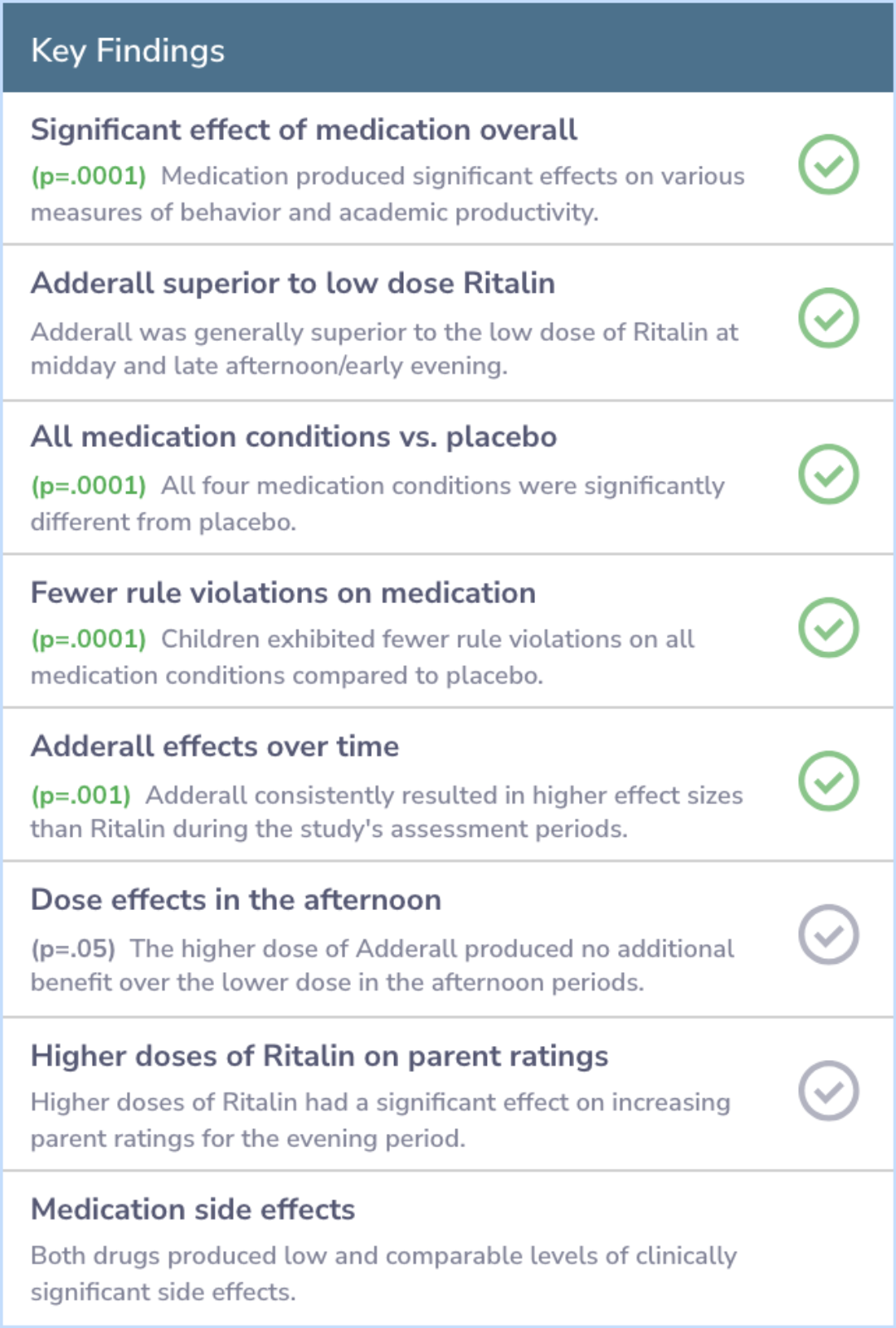
Study Summary
Conclusions
Overall, this study marks a significant step in comparing Adderall and Ritalin's effectiveness directly. It demonstrates that Adderall may offer a more lasting impact on managing ADHD symptoms in children, delivering improvements even as Ritalin's effects decrease over the day.
The findings also suggest that while both medications are generally effective, Adderall might be a more potent choice for many patients, leading to improved recommendations for clinicians considering these medications in their treatment plans. Despite these promising results, the presence of nonresponders indicates that medication alone may not suffice for every child.
The findings also suggest that while both medications are generally effective, Adderall might be a more potent choice for many patients, leading to improved recommendations for clinicians considering these medications in their treatment plans. Despite these promising results, the presence of nonresponders indicates that medication alone may not suffice for every child.
Abstract: conclusions
This is the first investigation to assess comparable doses of Adderall and Ritalin directly.
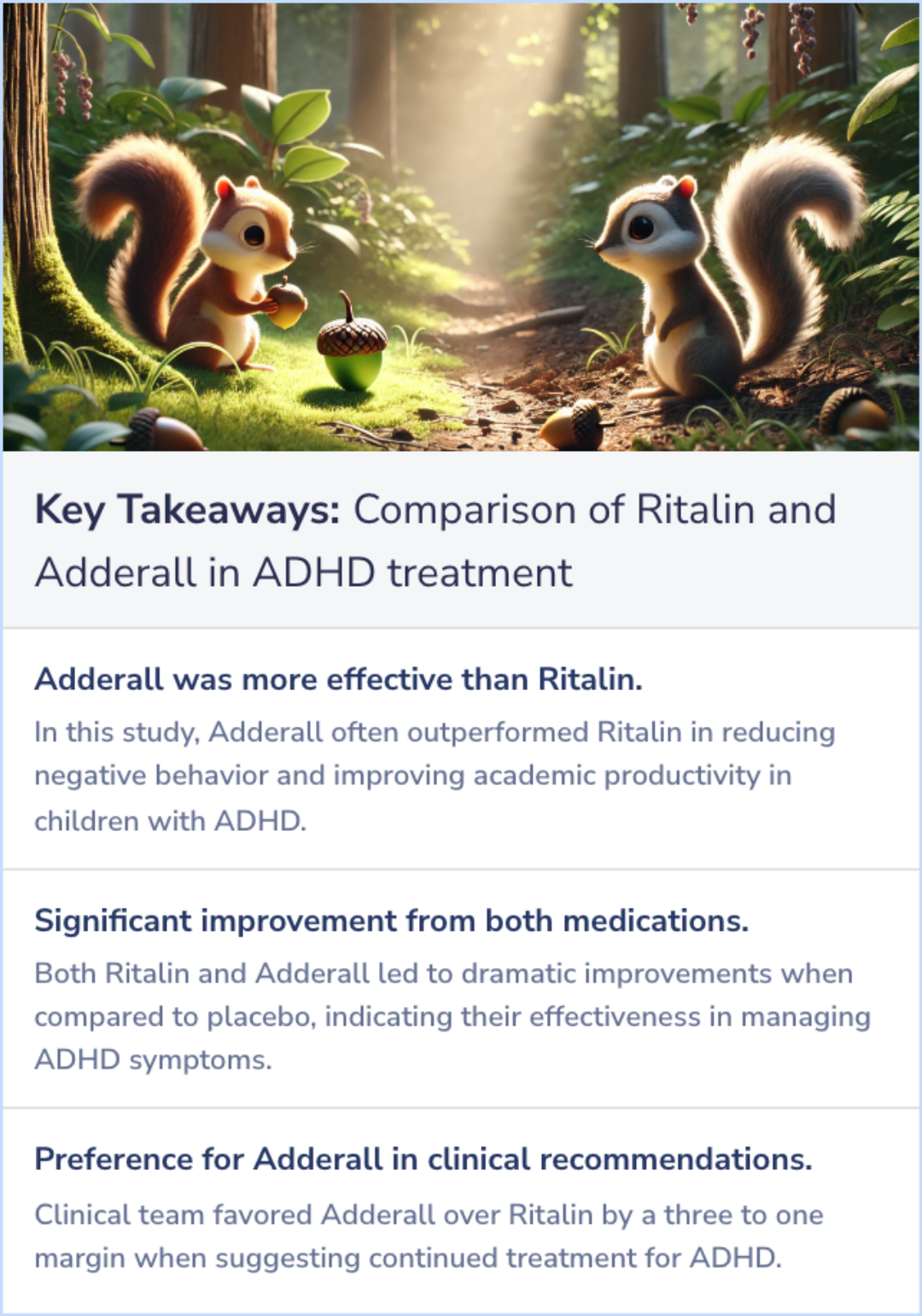
Background Information
Patient Guide
👨⚕️
Methylphenidate Uses
Ritalin, containing methylphenidate, is FDA-approved for treating ADHD in children aged 6 and up.
💊
Adderall and ADHD
Adderall is approved for ADHD and works by increasing dopamine and norepinephrine in the brain.
🔄
Mechanism of Action
Both Ritalin and Adderall increase dopamine and norepinephrine, enhancing concentration in the synaptic cleft.
⏰
Adderall Administration
Adderall is usually taken in different formats, with doses spaced apart to avoid insomnia.
📉
Growth and Cardiovascular Risks
Long-term use of both drugs can lead to growth suppression and cardiovascular risks.
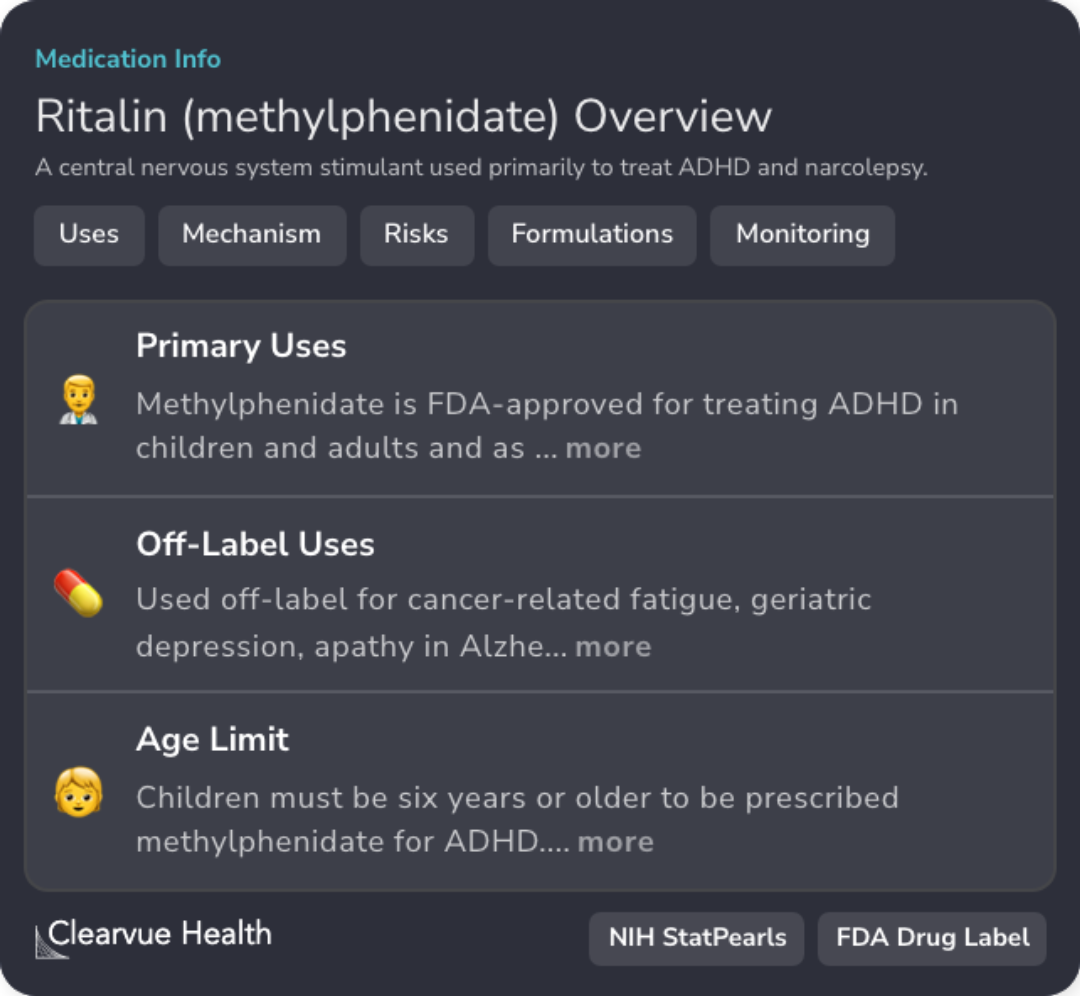
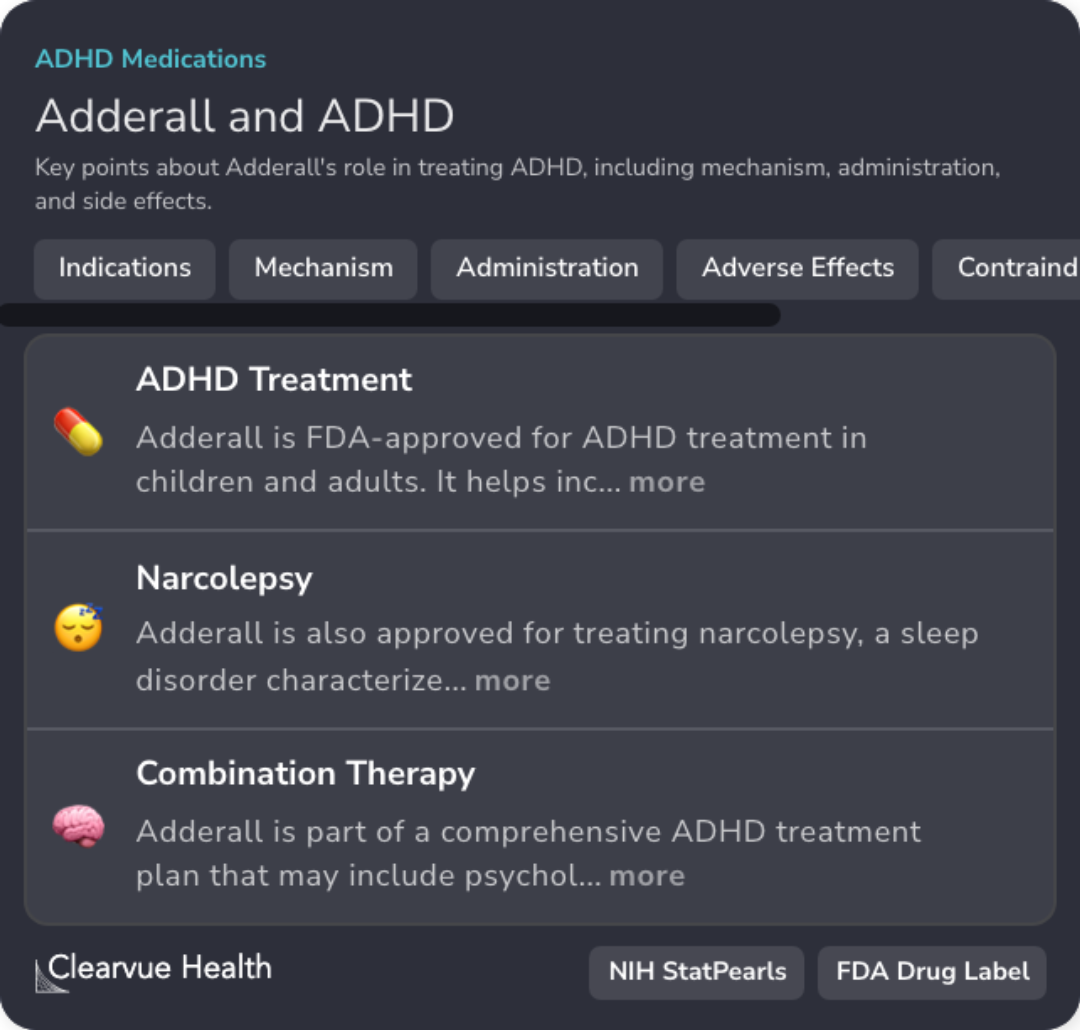
Professional Guide
Expert Opinion: Adderall vs. Ritalin for ADHD—Adderall Shows Longer-Lasting Effects
Methylphenidate, commonly prescribed for preschool children with ADHD, is often favored due to limited research on nonstimulant medications for this age group.
The abstract correlates with findings that highlight the extended effects of Adderall compared to Ritalin, making it a superior option as the effects of Ritalin begin to subside.
Clinicians should carefully monitor heart rate and blood pressure in patients using stimulants like Adderall and Ritalin, given potential cardiovascular impacts.
Moreover, there is evidence that combining medication with behavioral therapy enhances outcomes, as observed in the structured behavioral program used during the study.
The need for vigilance is further emphasized by the possibility of stimulants lowering the seizure threshold in susceptible individuals.
The abstract correlates with findings that highlight the extended effects of Adderall compared to Ritalin, making it a superior option as the effects of Ritalin begin to subside.
Clinicians should carefully monitor heart rate and blood pressure in patients using stimulants like Adderall and Ritalin, given potential cardiovascular impacts.
Moreover, there is evidence that combining medication with behavioral therapy enhances outcomes, as observed in the structured behavioral program used during the study.
The need for vigilance is further emphasized by the possibility of stimulants lowering the seizure threshold in susceptible individuals.
Evidence Summary
Exploring ADHD Medication: Adderall XR vs. Strattera
Adderall XR and Strattera are both prescribed for ADHD in school-aged children, but they differ in their effects on attention and behavior. The article explores how each medication impacts these areas, highlighting both effectiveness and side effects. Insights gathered here enrich the broader picture of how these drugs manage ADHD symptoms beyond a comparison with other treatments.
Understanding their practical differences aids in assessing which may be more suitable for individual children, focusing on improvements in school performance and potential complications.
Understanding their practical differences aids in assessing which may be more suitable for individual children, focusing on improvements in school performance and potential complications.
Evidence Summary
Adderall vs. Ritalin: A Deep Dive into Efficacy and Recommendations
Adderall and Ritalin both show superior outcomes over placebo, significantly reducing negative behaviors and boosting academic productivity. While both drugs help, Adderall, especially at lower doses, often outperforms low doses of Ritalin in maintaining its effects into the afternoon.
Remarkably, the lower dose of Adderall matches the efficacy of higher doses of Ritalin, leading to more favorable staff recommendations, despite both drugs displaying similar side effect profiles.
Remarkably, the lower dose of Adderall matches the efficacy of higher doses of Ritalin, leading to more favorable staff recommendations, despite both drugs displaying similar side effect profiles.
Evidence Summary
Exploring MAS-XR's Impact on Growth in ADHD Treatment
The use of MAS-XR in treating ADHD prompts questions about its impact on children's physical growth. By examining data from clinical trials, researchers have explored how long-term exposure to this medication affects height and weight.
The focus on physical changes underscores the importance of monitoring growth patterns in young patients taking MAS-XR, offering insights into medication effects beyond behavioral improvement.
The focus on physical changes underscores the importance of monitoring growth patterns in young patients taking MAS-XR, offering insights into medication effects beyond behavioral improvement.
Evidence Summary
Daily Use of Adderall XR in ADHD Symptom Management
Adderall XR, when taken once daily, demonstrates effectiveness in improving attention and behavior for children with ADHD, according to the study's findings. The focus here is on the medication's ability to provide symptom control and safety over the course of the day. This investigation adds to the limited research on Adderall's use in managing ADHD symptoms in young patients, complementing existing findings on other medications.
